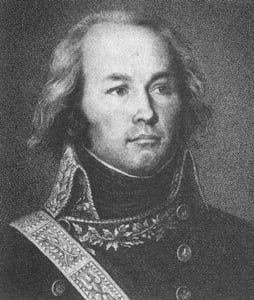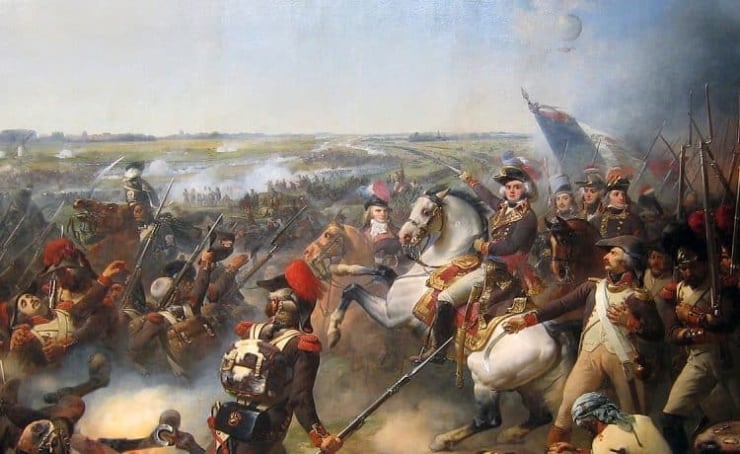Viky, děkuji za článek. 
22.2.1759 - "Napoleon's" General Lecourbe is born
Categories: Personalities , Calendar
 In French history he scored several major victories. Eventually he offered his services to Napoleon himself, with whom he was not on good terms. He defended a general who was preparing to assassinate the statesman. Claude-Jacques Lecourbe was born on 22 February 1759.
In French history he scored several major victories. Eventually he offered his services to Napoleon himself, with whom he was not on good terms. He defended a general who was preparing to assassinate the statesman. Claude-Jacques Lecourbe was born on 22 February 1759.
He was born the son of an officer. He was educated at Poligny and then at Lons-le-Saulnier, from which he escaped. He refused to accept punishment for indiscipline. In 1777 he joined the regiment of Aquitaine, and in the following years he served in the army during the siege of Gibraltar and the battles of Menorca. With the advent of the Revolution in 1789, Lecourbe joined the National Guard, where he served as a captain and was promoted to lieutenant colonel two years later. He subsequently served in the Rhenish army during the occupation of Porentruy and the Neuf-Brisach camp, and also in Mainz.
In 1791 he joined the army of Moselle and took part in the Battle of Fleurus, one of the most important engagements of the French Revolutionary Wars. But his military career soon went downhill and Lecourbe had to retire. He was suspected of plotting and forming a conspiracy against the Republic. He was imprisoned in Amiens, then transferred to Arras and finally to Nantes. In April 1794, however, the Revolutionary Tribunal acquitted him of all charges and he rejoined his battalion at Amiens.
Promotion to divisional general
He was soon recalled to service, and even promoted to divisional general. He was sent to the Rhine. In Switzerland he took command of the right wing of the army and attacked Grisons. He subsequently won at Finstermunz, where he and his men captured 1300 prisoners, and then won again at Martinsbruck. At the end of May 1799 he commanded the 1st Division, and in June Lecourbe defeated the Austrians at Wasen, where he suffered a wound in the arm. He became known as "General Fish" because he often crossed watercourses with his army.
Later he also took command of the 2nd Division and defeated the enemy at Seedorf. He was even offered to replace Moreau as commander-in-chief of the Rhine army, and so he went to Strasbourg to take up his new duties. He immediately went to work, leading his army across the Rhine and capturing both Heilbronn and Pforzheim. However, he was eventually forced to retreat and was defeated at Wisloch in early December 1799. Moreau was then reappointed commander-in-chief and Lecourbe took command of the right wing of the army.
Lecourbe resumed the campaign immediately in the spring of 1800. He crossed the Rhine at the end of April, and then in May he won at Stockach, fought at Messkirch, captured Memmingen, and took Augsburg. And other successes followed. In July, for example, he captured the towns of Fuessen and Feldkirche. In September, diplomats tried to negotiate a peace treaty, but the negotiations failed. And so Lecourbe threw himself into the fray again in November and December. Peace was not concluded until 1801.
The planned assassination of Napoleon
In 1802, Lecourbe settled in Paris. However, his career was almost ruined because of a plot to assassinate Napoleon. General Moreau, whom Lecourbe had stood up for, was implicated and fell into disfavour with Napoleon. Lecourbe had to leave Paris and lived in the Swiss canton of Jura. Specifically, he went to Ruffey, where he built a chateau and stayed there for several years. In 1813, General Moreau returned from the United States and joined the new coalition against France. As soon as the French police got wind of this, Lecourbe was put under surveillance, but he did not interfere.
After Napoleon's abdication in 1814, Lecourbe was summoned by the Comte d'Artois to Paris and rejoined the army as a general. He even later offered his services to Napoleon because France was threatened by foreign powers. He was put in command of the 18th military division and proclaimed Count of the Empire. Lecourbe took command of the troops at Belfort and tried to defend France's eastern frontier. Despite French losses at the Battle of Waterloo, Lecourbe refused to surrender to the Austrian army. For several weeks he successfully defended himself with six thousand men and blockaded an enemy army of 40,000 men. He also won several partial victories in the battles of Foussemagne, Bourogne and Chevremont. He finally signed an armistice in July 1815 and then retired again. He was awarded the Grand Cross of the Legion of Honour. He died on 22 October 1815 at the age of 56, the battles having taken much of his strength.

Sources: www.frenchempire.net, www.napoleon-histoire.com
The article is included in categories:



